- Home
- S. E. Hinton
Some of Tim's Stories Page 6
Some of Tim's Stories Read online
Page 6
You’d grown up in Tulsa, Oklahoma, and suddenly you were on a national stage. Were you anxious at all when you planned your first trip to New York?
I’d never been out of Tulsa, except to go to Texas to visit my grandparents, so I was excited about the trip. My mother was wringing her hands, saying, “An eighteen-year-old cannot go to New York City alone.” So she sent my fifteen-year-old sister to take care of me. I had a great time, but The Outsiders was not an overnight bestseller. My first royalty check was for twelve bucks. Even in those days twelve bucks didn’t get you more than three tanks of gas, so I went on to college. I ran into my statistics teacher a few years ago, and she said she hoped I knew she had cut me a lot of slack. I said, “I know you did, and bless you!” I did everything but kneel at her feet. I also had some professors who graded me very fairly.
Were you still writing?
I developed a really bad case of writer’s block, which lasted for over four years. For the first time, I was aware of the audience. When I was writing The Outsiders, it was for me; I wasn’t thinking about getting published. I still envy those days. I’ve never written anything with the idea, “Oh kids will like this,” but in the back of my head now I know that somebody’s going to review me. Not all reviews of The Outsiders were favorable. I remember Kirkus absolutely hated the book and said, “You can believe a kid wrote it, but kids are never going to believe a thing it says.” Well.
Famous last words.
Yeah, famous last words. Finally my boyfriend, David, who is now my husband, got annoyed with me for being so gloomy. I’d been writing all my life and couldn’t use the typewriter to type a letter. He told me that if I didn’t write two pages a day, he wouldn’t take me out in the evening. That was the great motivation for my second novel. I wanted to go out, so I’d write the two pages. I was very careful about each sentence. I was reading a lot of really good writers in college, and I’d magnified everything that was wrong with The Outsiders. I told myself I was going to do the new book right. The book, which turned out to be That Was Then, This Is Now, required very little rewriting. Technically I think it’s a better book than The Outsiders, but it doesn’t have its emotional impact.
Your given name is Susan Eloise. How did you become S. E.?
My publishers asked me if they could just use my initials because of the subject matter. They thought if reviewers picked up The Outsiders and saw that a girl had written it, they would read it with bias. The initials sounded great to me. I liked having a public name and a private name. At first, reviewers would mention that a young man had written the book, but after a while I wasn’t a secret. I was on television; I was on radio.
Earlier you talked about your focus on male characters in the book. I wonder if you might elaborate on that a little bit more. Why exclusively male characters?
I had two close cousins who were like brothers to me, and I ran around with them and their friends. I liked to play football. I liked to hunt ducks. I liked to go fishing. I just thought if I wrote that girls were doing these things, nobody would believe it. It’s easier for me to write from a male point of view. I know I’m convincing because I get letters from guys to this day saying, “Mr. Hinton, I like your books.” The only book I’ve written from a female point of view is The Puppy Sister, an elementary-age book told from the viewpoint of a female Australian shepherd puppy. I switched gender and species. Other than that, I usually stay with the male characters.
How closely did you identify with your narrator, Ponyboy Curtis, in The Outsiders?
Ponyboy Curtis is probably the closest I’ve ever come to putting myself in a book, even down to the physical description. He had my ideas; he had my personality. And he and I both liked sunsets. My mother would yell, “Why are you taking so long to get the garbage can back in the house?” It would be because I was standing outside watching the sun set.
Wasn’t Different Sunsets your original title for the book?
It was, but I had a wonderful editor, Velma Varner, who thought that title would be too “soft” for the story. I agreed. The Outsiders encompasses so many different levels. I’m glad I changed it.
Is the novel based on any of your actual high school experiences?
When a friend of mine got beaten up on his way home from school one day, I began a short story about a kid who got beaten up on his way home from the movies. That turned out to be the beginning of The Outsiders, but I didn’t base anybody in the book on real-life people.
One story has it that you researched the book and got a feel for greasers by carrying a knife. Fact or fiction?
Fiction, fiction, fiction. I did carry a knife, but it wasn’t like I was researching a book. I thought it was cool. I didn’t use it for anything. It did come out in the washing machine once, but I told my mother it was a letter opener.
Why do you think so many myths abound about you and your writing?
I have no idea. People have written saying they knew my college roommate; I didn’t ever have a roommate in college. I’ve had offers from people who want to do a movie of my life, and the very thought makes my skin crawl. I’m a real private person. That’s why I rarely have my picture in the newspapers. I don’t like being recognized in public. It startles me when I’m wandering around in the grocery store, usually in sweat pants and without makeup, and someone yells, “S. E. Hinton!”
And I’m sure you get lots of fan letters.
It’s the guilt trip of my life that I can’t answer all my mail. I just can’t. I live a very simple life. I don’t have help; I’m not in a castle with a big staff. I’m trying to keep myself as domestic as possible because I don’t want to get isolated from realities. I think that’s very important to my work.
Who is Jimmy, the person to whom you dedicated The Outsiders?
Jimmy is my cousin. We were closer than a lot of brothers and sisters, and I was hanging out with his friends when I was writing The Outsiders.
How did Jimmy respond when he found out you dedicated the book to him?
He didn’t say anything. That’s Jimmy. He’s a quiet person.
One of the book’s outstanding achievements is the way you’re able to depict your male characters, all close in age and circumstance, so distinctly. How did you avoid teenager stereotypes?
I’m a character writer. I know my characters’ astrological signs; I know what they eat for breakfast. It doesn’t matter whether those details show up in the books themselves. I have to become my narrators the way actors become their characters.
What astrological sign is Ponyboy?
Ponyboy has the same birthday as I do, July 22; he’s a Cancer, on the cusp of Leo.
Your characters’ names add to their uniqueness. Instead of “Tom” and “Mark,” we have “Ponyboy” and “Soda.” How did you decide on these nontraditional names?
I don’t know where “Ponyboy” came from, but I did know a guy whose name was “Soda.” And I think the name “Johnnycake” probably came from Johnny’s last name, “Cade.” Kids love those names. One of my readers saw the TV show My Name Is Earl, and a character mentioned hanging out “Ponyboy-style.” If he’d said “Bill-style,” nobody would have known what he was talking about.
After Ponyboy, which character in The Outsiders is closest to your heart?
Actually every character any writer writes is a part of her; writers are the filter. As much as I was Ponyboy, I was every one of the characters in that book.
Johnny’s an especially moving character. Did you know when you started the book that he was going to die, or did you discover that in process?
I discovered that in process. To me that’s the way the story happened. I didn’t make Johnny die; he died. I didn’t have a clear frame for The Outsiders when I started it. I just sat down and began writing. I’d get stuck, go to school, and say, “I’m writing a book. This is what’s h
appened so far. What should happen next?” I was taking help whenever I could get it. I came across a Robert Frost poem, “Nothing Gold Can Stay,” in an English class, thought it said what I wanted to say in The Outsiders, and so I wrote it into the book.
“Nothing Gold Can Stay” seemed to give the book a central theme. Is it true that some people actually think you, not Robert Frost, wrote the poem?
That is true, which is not the worst thing that can happen to a writer! Sometimes I go to speak to librarians or teachers, and they’ll introduce me with that poem. I’ll get up and say, “I hope everyone knows that was actually written by Robert Frost.” But it is definitely very, very tied into the novel. Even in casual references to the book, people say, “Stay gold.”
That’s how you sign your books many times.
Yes, people ask for me to sign with “Stay gold” all the time. A lot of fans ask Ralph Macchio to sign his autograph that way, too.
Why do you think that poem resonated so much with you and your readers?
Because it’s about the loss of innocence and about how the idealist in you has to come up against the compromise of living in the real world.
Did you ever consider telling this story in any point of view other than first person?
No. I’m very comfortable with the first-person narrative, but I do have to have the resources emotionally to bring me into the character.
As Ponyboy, you write some wonderful lines. In the heart of the novel, Ponyboy looks at Johnny resting on the couch and says, “Maybe people are younger when they are asleep.” Do you remember where you were literally and figuratively when that insight came to you?
I have to admit that I don’t know where a lot of that came from.
Also Ponyboy avoids pat descriptions of the people he loves. He speaks of Soda’s “finely drawn, sensitive face that somehow manages to be reckless and thoughtful at the same time.” Were you seeing Soda through Ponyboy’s eyes or was he seeing Soda through yours?
I was seeing Soda through Ponyboy’s eyes. I mentioned somewhere that Ponyboy likes to draw, to draw and sketch. He even talks about how he liked to sketch Dallas because he could get him down in a few lines. He’s thinking like an artist.
You mentioned earlier that your editor wanted you to change the title of the book. What sort of editing process did you go through with The Outsiders?
Velma didn’t tell me what to write. She just told me how to deal with what I’d already written. The Outsiders is very much my book, but it’s a better book because Velma gave me suggestions. She was specific. I’ve developed lifelong friendships with my other editors—Craig Virden, George Nicholson, Ron Buehl—and they became a great part of my writing life, but Velma was the one who opened up my eyes to the editing process.
As you look back at the book as a more mature writer, do you view the adult characters any differently?
All kids like to think that their little land is completely off the map for adults. I wasn’t ready to do adult characters at that point, so I don’t miss them. The kids don’t miss them. The one adult character that pops up is the guy at the church who doesn’t rescue the kids because he’s too fat to get them down.
When the book was first published, critics commented on what they viewed as the religious symbolism in the story, but you insisted that that was just their notion. Do you still feel that way?
If you want to look for religious symbolism in the book, you will find it. About the third time I got somebody’s dissertation on religious symbolism in The Outsiders, I re-read the book with that in mind and, by golly, it’s there. But lo, I bring you tidings: I didn’t do it consciously. So much of my writing is subconscious. I keep hoping to find a way to take a nap and wake up with a chapter done. Johnny Cade is a Jesus figure who dies saving people. He comes back from death with his message of brotherhood for Ponyboy, and he dies between two thieves, Dallas and Bob. I mean, he writes in the dust of a church, “Be back soon,” and signs it “J. C.” The book even opens and closes with the line, “When I stepped in the light from the darkness.”
At one point, The Outsiders was the second-best selling paperback for young adults in publishing history, topped only by Charlotte’s Web. What’s your opinion of Charlotte’s Web?
I love Charlotte’s Web. Charlotte’s Web and The Outsiders are both about the same things. They’re about death; they’re about friendship; they’re about sacrifice; they’re about resurrection.
What do you think of the recent young adult bestseller Harry Potter?
I haven’t read Harry Potter. I never was into fantasy. I’ve seen a couple of the movies, and I’ve enjoyed them. My reading time is so precious to me that I want to read what I want to read. But any book that gets kids into reading is great.
Earlier you said that you felt you were destined to write The Outsiders—it was meant to be. Could you speak a little more about the role you feel destiny played in the book?
The Outsiders almost died on the vine because it was published initially as a mass-market paperback, a drugstore paperback. Dell was about ready to stop printing it but noticed it was starting to sell well in several places and did some research. Teachers had found that they could get nonreaders to read it, and they were ordering books for all their classes. Teachers are my heroes anyway, but I’ll tell you, they’re the best damn advertising a writer can have.
You talked about the hundreds of fan letters you’ve gotten, people telling you that The Outsiders has changed their lives. How has it changed your life?
Well of course it’s changed my life drastically. I’ve had the luck and the leisure to be able to write and make a living out of it. Frankly I could live off The Outsiders, so it’s given me a lot of freedom as a writer. I can write what I want to without worrying about the audience. And it’s given me a lot of satisfaction to be part of something that has touched so many peoples’ lives and hearts. I just had somebody on the radio ask me how it felt being known for my first book. I said, “From what I hear, it beats being not known at all.”
Sequels
“He’s okay, but I don’t share the pillow.”—Mr. Smithers
JULY 18, 2006—TULSA, OKLAHOMA
Even though I’ve learned to expect the ceramic Siamese curled up in Susie’s living room chair, it still startles me. The cat is territorial and seems to pounce on any imagination that bypasses it en route to the den, the room where Susie is most comfortable. Susie already has tumblers of wine waiting for us, and we assume the same places on the sofa that worked for us during our first interview. Ours is a relaxed conformity. We know where to plug in the tape recorder—there is an extension cord under the coffee table—but we also allow ourselves “unplugged” time in between questions to top off our glasses. Another Siamese stares at me from a portrait above the large-screen television. Like its ceramic counterpart, it flirts with the notion of being real. “That’s Mr. Smithers,” Susie says, but she is referring instead to an actual cat that has joined us to sit rigidly atop the coffee table. Smitty, an orange tabby, looks porcelain. Susie claims as an aside that she keeps him because he matches her décor—the oranges and browns—but her affection is obvious as she explains he can disco dance on command. He isn’t in the mood, so our thoughts grudgingly turn to fiction, real life, and some fuzzy distinctions.
So many wonderful things came to you courtesy of The Outsiders: international recognition, financial security.
I was making about two cents a book. I’ll call it financial help in the first few years, but it certainly wasn’t security.
During our last visit, you talked about the writer’s block you developed after The Outsiders when you were working on That Was Then, This Is Now.
In the ending of That Was Then, This Is Now, when Bryon says he’s emotionally drained from caring about people, he reflects my own state of mind. I was emotionally drained from having lived
The Outsiders and then having it be over. It just wiped me out.
You’ve said what a help your boyfriend, David, now your husband, was to you while you were writing the book. Did that strengthen your relationship?
It’s funny, because I got the contract on our wedding day. Before, when the contract for The Outsiders arrived on graduation day, I thought, Graduation is nothing; I sold my book! But when my contract came for That Was Then, This Is Now, I was thinking, This is nothing; I’m getting married.
Many writers—Harper Lee is an example—write such successful first novels, they wonder if they can ever write at that level again. Did you experience any of those feelings after The Outsiders?
I still think I can write something better than The Outsiders, but I’ve given up hope that I’ll do anything that’s as well loved. That doesn’t bother me. How can you top something that has touched people the way The Outsiders has? I don’t even worry about that.
Was there a defining moment for you when you realized that, because of your newfound celebrity, you were going to have to establish some boundaries for yourself and your fans?
At first I was as accommodating as I could be about giving speeches, but I’ve learned when to say no. I can be either a writer or a speaker. I hate speaking, love writing, so the choice is obvious.
You realized the story of The Outsiders so completely that readers felt as if Ponyboy, Soda, and Darry were personal friends. How much pressure did you feel to write a sequel?

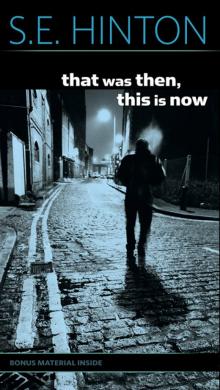 That Was Then, This Is Now
That Was Then, This Is Now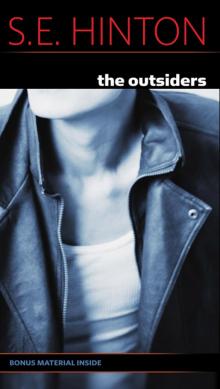 The Outsiders
The Outsiders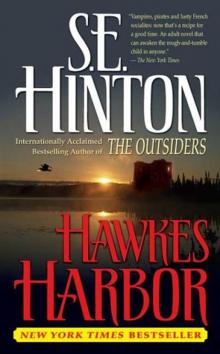 Hawkes Harbor
Hawkes Harbor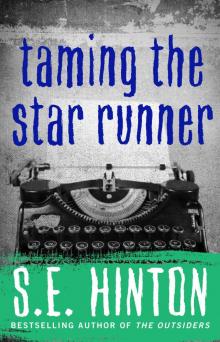 Taming the Star Runner
Taming the Star Runner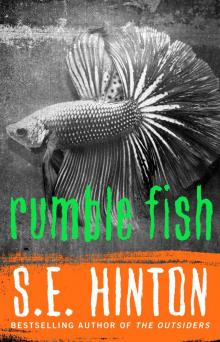 Rumble Fish
Rumble Fish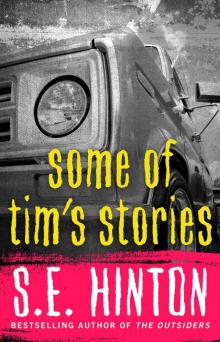 Some of Tim's Stories
Some of Tim's Stories